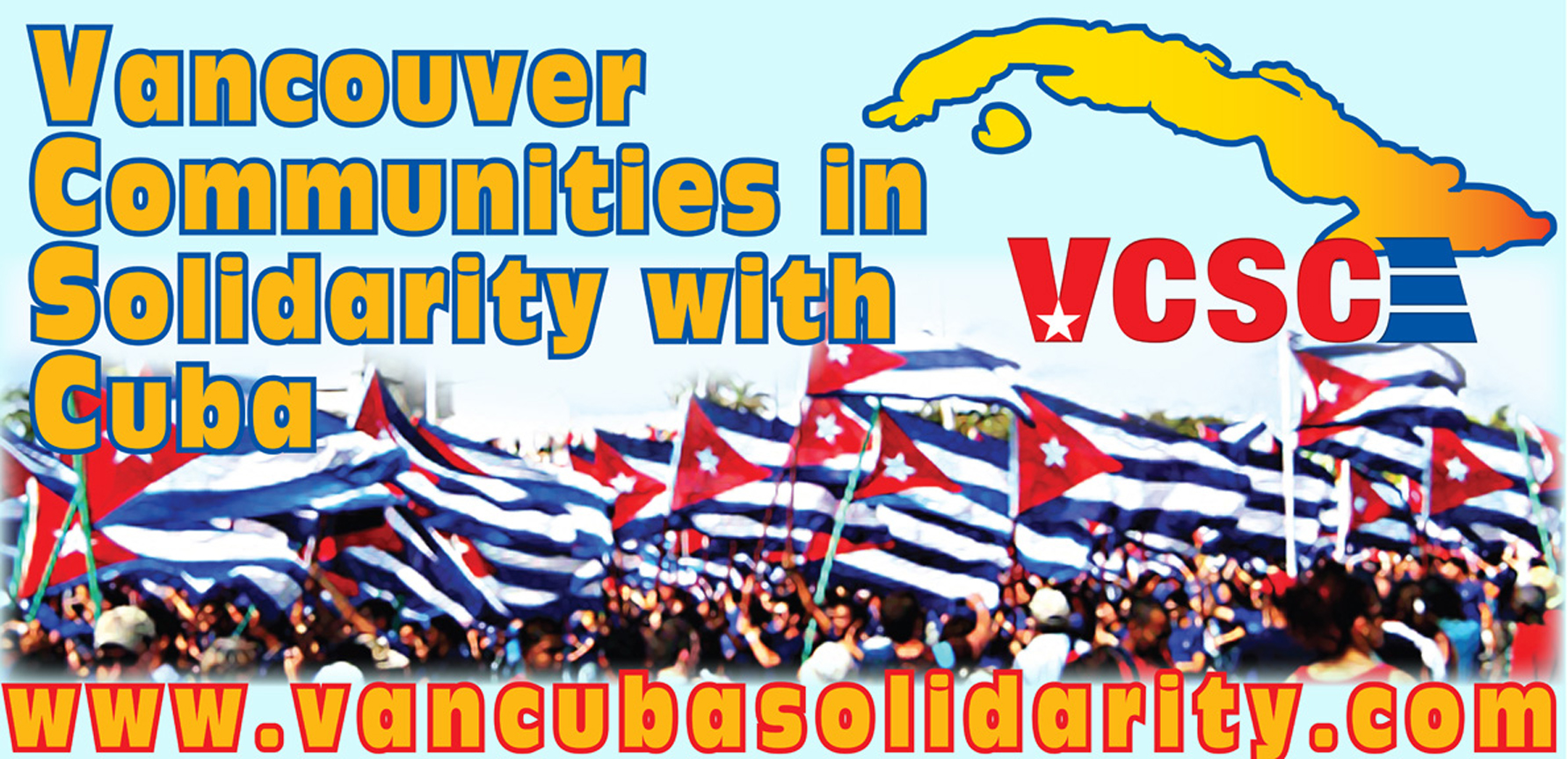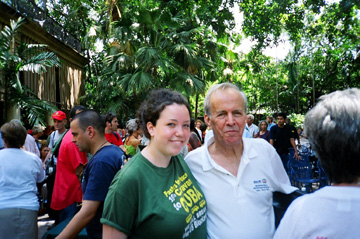




 Summer 2005
Summer 2005Visiting Cuba Through the Eyes of a Young Canadian Activist
A Memoir of a trip with Adventure, Education and Politics!
OR
How I Learned to Love Cuba!
First Appeared in the Fire This Time Newspaper
Part 3
By Sophie Ziner
“Fi-del, Fi-del, Fi-del”, a sea of people beneath our balcony were chanting. It was ten minutes to 6:00 on July 26th, and we were in the Karl Marx Theatre in Havana. The 3000 other people that were chanting, waving flags and singing were the representatives of schools, unions, neighborhoods from all over Cuba. Two young women on stage with microphones were calling on different delegations, and that group would stand up and do a cheer.
Cubans celebrate on the 26th of July to mark a significant battle in 1953, in which a fledgling group of revolutionaries attempted an attack on the military barracks in Moncada. This attempt sparked a series of events and actions that would eventually, in 1959, lead to the overthrow of the oppressive US-backed dictatorship of Fulencio Batista and the establishment of a revolutionary government.
So that’s what Fidel started out his speech talking about- the attacks that Cuba had faced over the last year. He spoke on the tightening of the blockade by the US administration, of the five Cuban heroes that are currently being held in US jails for investigating terrorism against Cuba in Miami, and the constant slander and attacks by the media of imperialist countries. He outlined these things and then went into Cuba’s response to them- that is to continue to build, to fight for the gains that have been made for the people of Cuba in the face of these attacks.
Fidel finished his speech by talking about the importance of the ever-growing connections between Cuba and Venezuela, about how the changes Venezuela is going through show how the ideas of the Cuban revolution can never be blockaded or killed.
The opportunity to hear this historic figure, this revolutionary was unbelievable.
I was in Cuba hearing Fidel speak on the 26th with a group called Pastors for Peace, a US-based solidarity group. Since 1992, Pastors for Peace has traveled to Cuba, carrying humanitarian aid down from Canada and the US and across the US border to Mexico, intentionally breaking the US blockade of Cuba. Traveling with 150 other “Caravanistas”, we had taken 180 tonnes of humanitarian aid across the Texas/Mexico border, loaded the aid onto a barge, and traveled on to Cuba.
Pastors for Peace is one of many Cuba solidarity groups around the world which have taken up the task of defending Cuba from the attacks it faces. As a young person and a social justice activist, I had become involved in Cuba solidarity organizing after learning about how Cuba has fought for the human lives and dignity of its people.
This trip was my first time traveling to Cuba.
The next day, we left Havana for a trip to the Isle of Youth. After a boat ride on a 100% Cuban made, state-of-the-art ferry, we arrived at the city of Nueva Gerona, and were met coming off the boat by children giving us all roses and a full band playing.
The Isle of Youth is famous for its arts schools, and our two-day visit there featured several wonderful cultural events with music, dancers, a contortionist and many other incredible things. We also continued to visit clinics, museums (such as the Presido Modelo Prison, where Fidel and others were held for two years following their capture during the attack on the Moncada Barracks, where Fidel wrote his famous speech “History will Absolve Me”.), foster homes, schools etc.
We met up with representatives from the Island’s UJC-Union of Communist Youth. We sat facing each other. There were maybe 40 of us, and 30 of them. Several people spoke from both delegations, including the young woman who is the head of the UJC for the province. During discussion that followed, a young man from the Cuban delegation got up and said “We see that there are young people in your group, and I wanted to ask them a question specifically- I want to know why young people in North America are interested in Cuba, and why they would choose to support the revolution.”
I realized then that I definitely had something to say on this subject, and that the question cut to the heart of why I was in Cuba, so I spoke up. I reiterated what had been said- that young people and students are marginalized in North America- and how we understand that we are under attack by capitalism, our education suffers while money is spent on military, we face low wages and low job security, but that we also see that there are many other people in this world who face these attacks and attacks from the same source. I talked about feeling connected to the struggles of people in Iraq, Afghanistan, Haiti and Palestine, and the struggles of Indigenous people all over the world. I said that we see these connections and we want to fight for them too, but it’s a huge fight, overwhelmingly so, and it’s easy to get demoralized and frustrated. So to deal with that, we turn to the leadership of those who are at the forefront of the struggle against imperialism- Cuba. I talked about how the leadership of Cubans, especially young Cubans, reminds us of the world we want to build and leaves us with no choice but to join them.
After dinner, we got back on the bus and went into the city and to a neighbourhood party organized by a Committee for the Defence of the Revolution, or CDR. In Cuba there is a CDR in every neighbourhood, and they are the most local level of government. In each neighbourhood, representatives are elected and represent their communities on a municipal level.
The head of the CDR introduced several dance and singing performances by several children. She then announced that she wanted to give us a glimpse of what their CDR was like. She first asked everyone who was part of the Jose Marti Pioneers to put their hand up. (The Pioneers is an organization for children in Cuba, sort of like Scouts or Guides.) All of the children put their hands up. She then asked for everyone who was part of the High School Students’ League to put up their hands, and many of the teenagers did. She asked everyone who was part of the University Federation to raise their hands, and many of the young adults put up their hands. Out of maybe 150 people, almost all of the adults put up their hands when she asked for everyone who was part of a union to raise their hand. Most of the women were part of the Women’s Federation. She went on, asking for those who were in the Communist Party, asking for those who were part of the block watch, on and on, and then finally she asked:
“Would everyone who fought with Fidel and Che in the Sierra Miestra please put up their hand?” and sitting at the front, one old man put up his hand- and every one cheered and applauded, and it was very clear how proud the neighbourhood was to have him part of their community. After that, the music started again, and soon we were all dancing, eating and chatting.
It was amazing to see how connected everyone was, how these almost 150 people in the neighbourhood seemed like one family, and to see the energy and excitement and pride they had for their CDR and for Cuba.
I left thinking about the place where I grew up on Vancouver Island, where even though it was a small town, we rarely talked to our neighbours, and where I maybe saw the mayor or the MLA for our area once a year in a parade. Cuba has a 97% average turn out for each election, compared to a 64.7 % rate of eligible voter turnout in the January 2006 general election in Canada. The comparison between the attitude of Cuban people towards their government and their communities, and their commitment, energy and confidence is completely different to what I’ve experienced growing up in Canada.
When we returned to Havana the next afternoon, I spent some time with a friend of mine that I had made at the facility where we were staying. My Spanish is not great, and in a halting and stumbling conversation with Julio, I guess I accidentally used a French word, and we discovered that we could both speak French.
Julio spoke French because his grandparents were from Haiti. Haiti is a country 90 miles away from Cuba to the East, where the people live in stark contrast to the people of Cuba. Already devastated for hundreds of years by colonial and imperialist intervention, in 2004, the US, Canada and France invaded Haiti, expelling Haiti’s first democratically elected president. The turmoil that the people in Haiti have experienced since has dropped them to the poorest nation in the western hemisphere.
Julio talked about a lot of things- the challenges of life in Cuba under the blockade, the position he saw Cuba in the world, his hopes for the international Cuba Solidarity movement. He talked about going to school in Cuba, and about the “Special Period” Cuba went through after the fall of the Soviet Union, which had devastating effects on the Cuban economy.
In fact, almost every Cuban I met told me something similar- that life in Cuba wasn’t always easy, that Cuba IS still a third-world country, and that the blockade makes getting things as simple as an aspirin almost impossible sometimes. But they also told me that they would never, ever go back to the Cuba of pre-1959, the gangster’s paradise, the poverty, the illiteracy, and the disease, and that they would defend the gains that have been made to the last drop of their blood.
On our last day in Cuba, we had a very exciting meeting with the families of the Cuban Five, as well as the President of the National Assembly of People’s Power and Vice President of Cuba, Ricardo Alarcon.
The Cuban Five are five Cuban men who have been held in US jails since 1998. They were arrested for investigating the terrorist groups that work out of Miami. Sent there by the Cuban government, they had collected hundreds of pages of documents outlining the plots that these anti-Cuban government groups were intending to carry out to terrorize the people of Cuba. They turned the information in to the Cuban government and to the FBI- an agency that is supposed to be fighting terrorism in the US. Instead of gratitude for information about terrorist threats in their own country, the US authorities threw the five men in prison, and continue to deny them many rights and fair treatment.
Fernando Gonzalez’s mother opened the meeting, talking about the history of the case, and the international campaign that has been going on for seven years. Then Mr. Alarcon spoke. He talked about the case in a political context of Cuba being under attack by the US, and using the case as a tool to expand Cuba solidarity and expose the hypocrisy of the US administration, and their so-called “War on Terror”. He talked about the corporate media in the US and their cover-up of the trial and case. He said that we need to be confronting the lies put out by the media of the imperialist countries where we live, but also creating other means of media.
Tears running down my cheeks, I sat quiet on the bus that night driving out of Havana to the airport, my head full of the things I saw and learned. My brief glimpse of Cuba, of the Cuban revolution, the gains, the contradictions, the visions and goals, the people and the institutions had given me a whole new perspective of the world I lived in. Returning to Vancouver, I thought about what Ricardo Alarcon said to us that day in Havana: that Cuba solidarity, which is so important to the continuation of the revolution, needs to grow. The lessons that Cuba gives us here in Canada, a major imperialist power, of what regular people must fight for and can gain are vital to any social justice work we do. The example of Cuba, the leadership of Cuba, needs to be part of the arsenal of weapons, the ideas that us oppressed people must fight with. Under attack for 47 years, the Cuban people still fight, not just to protect what they have gained, but for real gains for all people around the world. Cuba’s resistance to imperialist attacks sets an example for all people in struggle, and with them we share our humanity, our hopes and our resistance.
I left Cuba changed, inspired and motivated.
To be continued…
go to part III!